

To promote road safety in Singapore, Traffic Police (TP) use the concept of operant conditioning which involve reinforcement and punishment strategies that will help to educate and encourage responsible driving behaviour and decrease irresponsible driving behaviour on the road.
Introduction to Road Traffic Accidents. An overview of Singapore Road Traffic Accident. Road accident statistics in Singapore 2020. Last Updated: January, 2020.
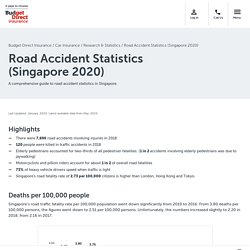
Latest available data from May, 2019. Highlights There were 7,690 road accidents involving injuries in 2018120 people were killed in traffic accidents in 2018Elderly pedestrians accounted for two-thirds of all pedestrian fatalities. (1 in 2 accidents involving elderly pedestrians was due to jaywalking)Motorcyclists and pillion riders account for about 1 in 2 of overall road fatalities73% of heavy vehicle drivers speed when traffic is lightSingapore’s road fatality rate of 2.73 per 100,000 citizens is higher than London, Hong Kong and Tokyo. Deaths per 100,000 people Singapore’s road traffic fatality rate per 100,000 population went down significantly from 2010 to 2016.
SPF Road Safety Video. Accidents in singapore. Traffic Offences in Singapore 2020. Traffic Offences in Singapore: Demerit Points & Composition Fines (2020 Update) What is Operant Conditioning? Skinner’s Operant Conditioning: Rewards & Punishments. What Is Operant Conditioning and How Does It Work? Operant conditioning, sometimes referred to as instrumental conditioning, is a method of learning that employs rewards and punishments for behavior.
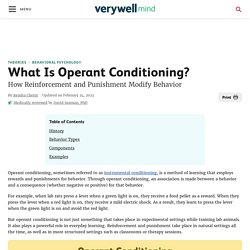
Through operant conditioning, an association is made between a behavior and a consequence (whether negative or positive) for that behavior.1 For example, when lab rats press a lever when a green light is on, they receive a food pellet as a reward. When they press the lever when a red light is on, they receive a mild electric shock.
As a result, they learn to press the lever when the green light is on and avoid the red light. But operant conditioning is not just something that takes place in experimental settings while training lab animals. The History of Operant Conditioning Operant conditioning was first described by behaviorist B.F. Through the first part of the 20th century, behaviorism became a major force within psychology. Early behaviorists focused their interests on associative learning. Types of Behaviors. Traffic Police Initiatives to promote Road Safety in Singapore. Strengthening Deterrence Against Irresponsible Driving.
Road Safety Campaigns. RoadSense Carnival On 6 July 2019, Traffic Police organised the RoadSense Carnival at the Ngee Ann City Civic Plaza.
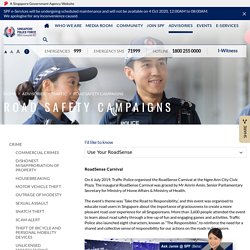
The inaugural RoadSense Carnival was graced by Mr Amrin Amin, Senior Parliamentary Secretary for Ministry of Home Affairs & Ministry of Health. The event’s theme was ‘Take the Road to Responsibility’, and this event was organised to educate road users in Singapore about the importance of graciousness to create a more pleasant road user experience for all Singaporeans. More than 3,600 people attended the event to learn about road safety through a line-up of fun and engaging games and activities. Traffic Police also launched eight characters, known as “The Responsibles”, to reinforce the need for a shared and collective sense of responsibility for our actions on the roads in Singapore.
Forum: Various initiatives in place to encourage safe driving, Forum News. Differences between Reinforcement and Punishment. Reinforcement & Punishment. Learning: Negative Reinforcement vs. Punishment. Positive Reinforcement. Certificate of Merit. What is it? And how can you get one? Getting a driver’s licence ensures that you are qualified to drive.

But along with that comes the responsibility of making sure you drive safely, not just for your sake but also for the sake of other road users. To ensure that drivers are aware of this and keep safety uppermost on their minds while driving, the Traffic Police has instituted a system of rewards and punishments. In March 1983, the Traffic Police introduced the Driver Improvement Points System (DIPS). How does the Driver Improvement System work? Under Singapore’s DIPS, chalking up 24 demerit points or more within 24 consecutive months will result in a suspension of your driving licence for three months. If you have been suspended before, your licence will be suspended again when you accumulate 12 points within 12 months of your last offence. For most drivers, the fear of racking up demerit points for traffic violations is a sufficient deterrent against reckless driving.
Certificate of Merit explained. Oct2019 singapore traffic police officers stop and reward riders whom suited up when riding. TRAFFIC POLICE REWARDS CONSCIENTIOUS... - Singapore Police Force. Traffic police rewards motorists for acts of courtesy. The Traffic Police is looking out for motorists who display courtesy on the road.
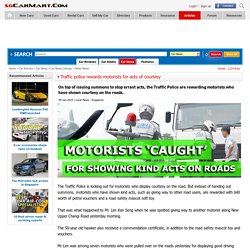
But instead of handing out summons, motorists who have shown kind acts, such as giving way to other road users, are rewarded with $40 worth of petrol vouchers and a road safety mascot soft toy. That was what happened to Mr. Lim Kan Seng when he was spotted giving way to another motorist along New Upper Changi Road yesterday morning. The 50-year old hawker also received a commendation certificate, in addition to the road safety mascot toy and vouchers. Mr Lim was among seven motorists who were pulled over on the roads yesterday for displaying good driving habits, as part of a nine-hour islandwide 'Spot the Conscientious Motorists' operation conducted by the Police. In Singapore, Traffic Police Give Vouchers As Well As Fines. Nobody likes traffic enforcement officers, or the summons they give when they catch you.
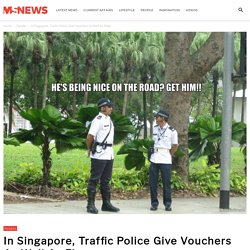
Now, however, Traffic Police have chosen to commend motorists for showing good behaviour…by giving them a commendation certificate, zebra plush toys, and petrol vouchers. Source They give out zebra plush toys because that’s the mascot for the Singapore Road Safety Council. Speed Warning Device. SPEED ALERT PRO - AUSTRALIA = Over Speed Warning Device. How it Works...Over Speed Warning System. Positive Punishment. Heavier penalties proposed for irresponsible driving offences under Road Traffic Act. P-Plate Vlog #09: Different Types of Traffic Cameras in Singapore! Harsher penalties for driving offences including longer jail terms and heavier fines, Singapore News. SINGAPORE - Irresponsible and reckless motorists may face longer jail terms and have their vehicles seized under proposed changes to the Road Traffic Act (RTA). Announcing this on Thursday (Feb 21), Ms Sun Xueling, Senior Parliamentary Secretary for Home Affairs (MHA) and National Development, said: “We want to increase the penalties for motorists who drive irresponsibly and cause serious accidents.
“This will deter them and ensure that they receive sentences that are commensurate with the harm they caused.” With the changes, dangerous driving and careless driving under the RTA will correspond broadly to offences of rash act and negligent act under the Penal Code. The authorities will consider the manner in which the vehicle was operated, such as whether the motorist was driving at excessively high speeds or manoeuvring his vehicle in very close proximity to other vehicles. Offenders will also face a minimum sentence of at least a year, if death or grievous hurt is caused. The 5 Different Types of Traffic Cameras in Singapore. (Photo Credit: Pexels) To deter speedsters from driving recklessly, the Land Transport Authority(LTA) and Traffic Police have put in place five different types of traffic enforcement cameras around the island.
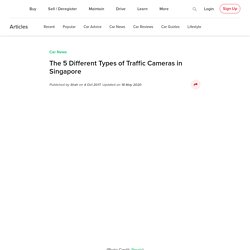
Here's a detailed guide on all five of them. Updated: 11 May 2018, Friday 1. Fixed Speed Camera. Driver Improvement Points Systems. Driver Improvement Points System (DIPS) - CabbyHub. Singapore’s demerit points system named the Driver Improvement Points System (DIPS) was introduced on 1 March 1983.
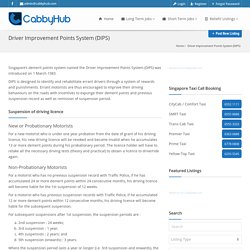
DIPS is designed to identify and rehabilitate errant drivers through a system of rewards and punishments. Errant motorists are thus encouraged to improve their driving behaviours on the roads with incentives to expunge their demerit points and previous suspension record as well as remission of suspension period. Suspension and Revoke of the Drivers’ Licence – Drink Driving in Singapore. ( Singapore Context)Under the road traffic act Section 48: Driving Licence WILL NOT BE GRANTED to any applicant if there is another licence held by the applicant which is suspended or revoked.
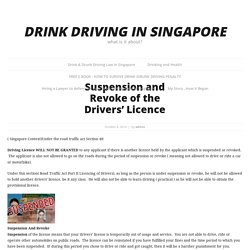
The applicant is also not allowed to go on the roads during the period of suspension or revoke ( meaning not allowed to drive or ride a car or motorbike). Under this section( Road Traffic Act Part II Licencing of Drivers), as long as the person is under suspension or revoke, he will not be allowed to hold another drivers’ licence, be it any class. He will also not be able to learn driving ( practical ) as he will not be able to obtain the provisional licence. Barred driver did not surrender licence and kept flouting traffic laws, gets 6-year driving ban. SINGAPORE: A delivery driver who was handed a three-year driving ban did not surrender his driving licence, and instead carried on driving and committing traffic offences.
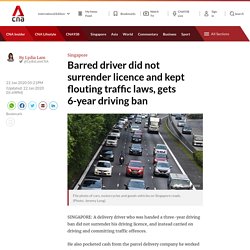
He also pocketed cash from the parcel delivery company he worked at. Rosideefarizal Onn, 30, was sentenced to 14 weeks’ jail on Wednesday (Jan 22) and banned from driving for six years. The court heard that he had been given a three-year driving ban in 2017 for previous traffic offences, which would kick in when he was released from jail. However, when Rosideefarizal was released from prison in August 2018, he did not surrender his driving licence as required within seven days of release.
He was banned from holding or obtaining a licence for all classes of vehicles between Aug 25, 2018 and Aug 24, 2021. Despite this, he continued driving, manoeuvring a car along Changi Road towards Geylang Road on May 2, 2019, and ignoring a red light. Parliament: Recalcitrant drink-drivers to face lifetime driving ban under stiffer penalties proposed to Road Traffic Act, Politics News.
SINGAPORE - Recalcitrant motorists who drive under the influence of alcohol or drugs could face a lifetime ban from driving and also double the jail time, under proposed changes to the Road Traffic Act that would also stiffen penalties for dangerous and careless driving offences. For instance, minimum mandatory sentences for dangerous driving causing death and grievous hurt, as well as additional penalties for offenders who did so while under the influence of alcohol and drugs, were also among changes proposed in Parliament on Monday (May 6).
Under the Road Traffic (Amendment) Bill, road users who drive under the influence of drugs or alcohol will face double the penalties that are currently stipulated in law. Currently, those convicted can face up to six months in jail or be fined between $1,000 and $5,000 for the first offence. For the second offence, they can be jailed for a maximum of one year and fined between $3,000 and $10,000.